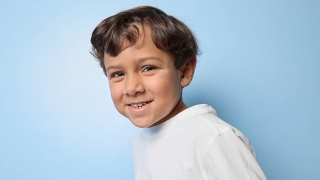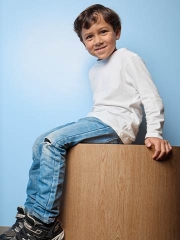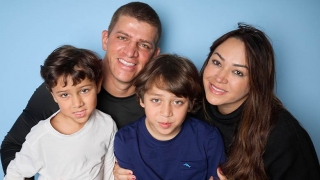Precision Medicine for Infantile Fibrosarcoma: Levy’s Story
Published on
Published on
Born with a very rare facial tumor, Levy’s medical journey took his family from their home in Brazil to a clinical trial in Texas led by Theodore Laetsch, MD. Levy is now cared for at Children's Hospital of Philadelphia’s (CHOP) Very Rare Malignant Tumors Program and the Center for Precision Medicine for High-Risk Pediatric Cancer, two programs that Dr. Laetsch leads.
 When Levy was only a few months old, his parents, Gustavo and Monique, noticed that the left side of his face looked a little swollen. “It was very subtle,” Monique says. They went to their pediatrician, who ordered an ultrasound. Monique is a doctor herself, “So I understand what that test could mean.” The imaging revealed a very large mass in the left side of his face. “We needed to do something quickly.”
When Levy was only a few months old, his parents, Gustavo and Monique, noticed that the left side of his face looked a little swollen. “It was very subtle,” Monique says. They went to their pediatrician, who ordered an ultrasound. Monique is a doctor herself, “So I understand what that test could mean.” The imaging revealed a very large mass in the left side of his face. “We needed to do something quickly.”
Preliminary results identified the mass as a sarcoma, but the medical team in Brazil didn’t know what type. “We were running against time,” explains Monique, “so they started chemotherapy right away.” Levy experienced many side effects from the chemotherapy and some frightening episodes, including a life-threatening infection called sepsis.
“It was very difficult for me to witness,” says Monique. “I’m a scientist, but it was a test of faith. I needed to hold on to God and trust that something would help him.”
 The doctors adjusted the chemotherapy medications and did another cycle, but Levy once again had many side effects — and his specific type of sarcoma remained unknown. They changed the chemotherapy again and did another round. “It was not shrinking the tumor,” says Monique. “I thought, ‘We can’t keep doing the same thing.’”
The doctors adjusted the chemotherapy medications and did another cycle, but Levy once again had many side effects — and his specific type of sarcoma remained unknown. They changed the chemotherapy again and did another round. “It was not shrinking the tumor,” says Monique. “I thought, ‘We can’t keep doing the same thing.’”
In May 2018, since the tumor was not responding to chemotherapy, it was suggested that Levy be seen at a cancer center in Houston, Texas. “We both have good jobs,” Monique says of herself and Gustavo, “but we couldn’t afford treatment outside of Brazil.” They shared their son’s story on social media and were met with an outpouring of generosity. The Brazilian community in Houston helped by securing an apartment for the family.
In Houston, 11-month-old Levy was diagnosed with infantile fibrosarcoma. This is a very rare, fast-growing tumor with a specific genetic change called a TRK fusion that drives cancer-cell growth. Based on this information, Levy qualified for a clinical trial being conducted in Dallas testing an oral drug called larotrectinib, which blocks TRK proteins and stops cancer-cell growth. Dr. Laetsch is the international lead investigator for the clinical trial of larotrectinib in children, and at the time was in Dallas overseeing the trial.
 Levy, pictured with his parents and brother.
“Our lives changed after the medication,” says Monique with awe. “All the complications of chemo — everything changed. He was fever-free. He could go to the park and play. Within one month, the tumor began shrinking. After three months, it shrunk 70%. It was such a miracle that a medication without side effects had done that.”
Levy, pictured with his parents and brother.
“Our lives changed after the medication,” says Monique with awe. “All the complications of chemo — everything changed. He was fever-free. He could go to the park and play. Within one month, the tumor began shrinking. After three months, it shrunk 70%. It was such a miracle that a medication without side effects had done that.”
The family returned to Brazil and came back to Dallas every month until the beginning of the pandemic. Then the medication was sent to their house, and visits were handled through video calls.
In September 2020, Dr. Laetsch joined the Division of Oncology at CHOP and launched the cutting-edge Very Rare Malignant Tumors Program, which seeks to develop new treatments for children. He also co-leads the Center for Precision Medicine for High-Risk Pediatric Cancer. Levy’s family followed Dr. Laetsch to CHOP, and Levy’s case exemplifies the strengths of both these programs. Now 5 years old, he shows how some children with rare and complex tumors respond to treatment based on genetic targets in the individual patient’s tumor.
Levy had a dramatic response to therapy. In June 2022, Levy stopped taking the drug and is being followed to see if he can maintain his remission off treatment. The trial he took part in led to FDA approval of larotrectinib in children and adults — an important step toward fulfilling the promise of safer, more effective cancer treatments with fewer side effects.